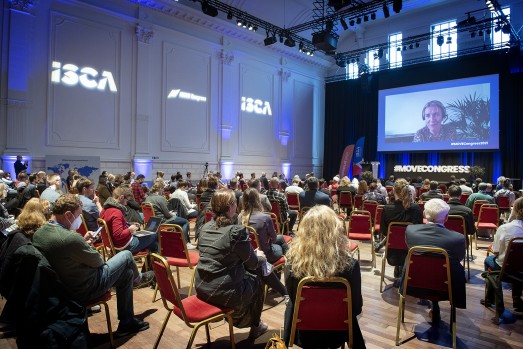WHO lead Dr Fiona Bull at MOVE Congress closing: We have to reinvent our system to meet physical activity targets
19/11/2021

For the MOVE Congress 2021, we at ISCA prioritised delivering a physical event, because we believe in the power of the physical meeting between people, and we wanted to enable our members and partners to come together to Reconnect, Rebuild and Restart. Some speakers were unable to be there with us in person, and we used our experience in delivering hybrid and online events to bring their expertise to the congress nonetheless. 300 participants, including 60 speakers plus performers, joined us in Brussels to be part of the MOVE Congress from 17-19 November 2021.
In the plenary session on Friday 19 November, Dr Fiona Bull, Head of the Physical Activity Unit, World Health Organization (WHO) Department of Health Promotion greeted the MOVE Congress participants from Geneva and gave a motivational keynote reminding everyone of the value and need for their work as a Rebuild, Restart and Reinvent sport and physical activity promotion from 2021 and beyond. Her speech was followed by a live Q&A with ISCA President Mogens Kirkeby, who asked follow-up questions from the MOVE Congress stage. The plenary session was live streamed on ISCA’s Facebook channel to a wider online audience.
“It’s with great regret I can’t be with you in person, as I have thoroughly enjoyed previous opportunities to join the MOVE Congress. But I’m absolutely delighted to be with you and say a few words to set off this final day of the Congress,” Dr Bull began.
“I know many of you will be really enjoying it because it’s back to what we enjoy most: sharing our experiences, sharing the challenges and discussing how we can help more people be more active… I want to congratulate the organisers and all of you for this important theme, this Reconnecting, Restarting and Rebuilding, and I’m going to add to it by adding Reinventing.”
The WHO’s Global Action Plan for Physical Activity has target of 15% improvement in physical activity levels across the world by 2030. But the pandemic delivered an unexpected blow to the initiatives supporting this goal, she noted.
“Being active has become so important to us all during Covid and it reminds us how important it is in terms of its contributions to the global agenda [of] global health. We know, but let’s remind ourselves, the importance of the [UN’s] Sustainable Development Goals. There’s real concern now that Covid has set us back on the progress being made, but that progress itself was not enough. We needed it to be accelerating, and now [we’ve been hit by] Covid. Now we’ve got to double that acceleration to reach the target of improving good health and wellbeing and the WHO is the custodian of that target around non-communicable disease.”
The updated WHO physical activity guidelines, published in November 2020, represented a reinvention when it comes to white paper recommendations. The pandemic prompted a quick changing of gears from prescribing minutes of moderate and vigorous physical activity to validating all forms of physical movement as a step in the right direction: “Let’s get it down to its bare facts – Every Move Counts,” she pointed out, reiterating the WHO’s slogan and adding, “Our task is evidence-based and clear.”
She urged physical activity promoters at all levels to join forces with the WHO, the UN, the private sector, civil society and government “to build back better”, “to reinvent and ensure we are providing physical activity to everyone”, extending an invitation to use the resources developed by the WHO to convince colleagues, communities and governments to support sustainable initiatives.
“We need to communicate the benefits… not just the physical benefits, but the mental health benefits and the social benefits to create more programmes for more people and address inequalities and we need to make sure that our systems will sustain this – not one-offs, not pilots, not demonstrations, but real change sustained.”
Mogens Kirkeby asked whether physical activity had lost ground in policy-making due to the focus on combating Covid-19 and Dr Bull responded optimistically, pointing to raised awareness of regular exercise in the UK, Jamaica and Asia (for example) and emphasising that “We think at WHO that it is a must-have policy action area.”
“I share your concern that physical activity has potentially lost ground. And yet, this is perhaps too simplistic because, at the community level, I think we have gained ground in the recognition due to the constraint, due to the confinement, due to the impact of Covid on how we live our lives. We’ve realised that moving has been central… so there’s an opportunity in this… In some countries there’s been increased focus on physical activity.”
Nevertheless, the data she showed indicated that physical activity is still lagging behind other persistent public health priorities, including the fact that tobacco control has more regulatory support than physical activity promotion. Sustaining physical activity programmes is also hindered by intermittent funding that prevents organisations from “building and scaling” their work. So the pandemic is an important crossroads, she said.
“We are at the very important stage of our work of creating and helping the world recover, rebuild and let’s use it to reinvent a stronger system together for better physical activity.”
To take action in our sectors, Dr Bull listed three potential drivers that can complement the WHO’s Global Action Plan: sustained communications, better environments for physical activity, and engaging people through inclusive programmes.
“I know that’s been a core theme of your conference and I congratulate you and look forward to hearing about your deliberations and suggestions.”
Watch the full Day 3 plenary here
Stay tuned for more opportunities to join in WHO and ISCA physical activity initiatives, coming soon.
Visit the official MOVE Congress website for our full coverage of all sessions.
By Rachel Payne, ISCA
Posted on 19/11/2021 by Rachel Payne, ISCA

